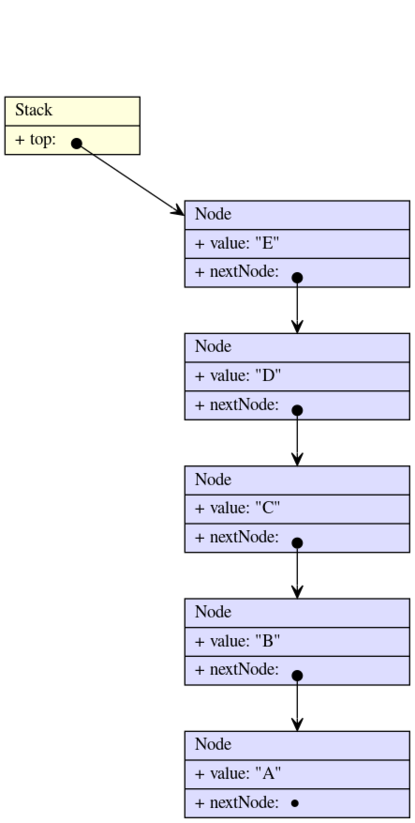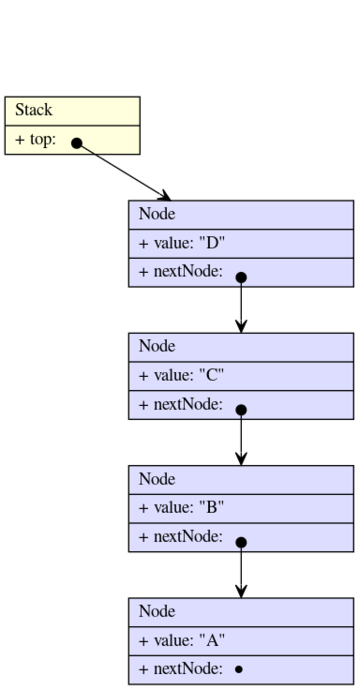Difference between revisions of "Atomic Stack Assignment"
| Line 144: | Line 144: | ||
===AtomicStack=== | ===AtomicStack=== | ||
| − | To be [https://www.javadoc.io/static/com.google.code.findbugs/jsr305/3.0.1/javax/annotation/concurrent/ThreadSafe.html @ThreadSafe], | + | While ConcurrentStack could simply rely on synchronized to provide thread-safety, AtomicStack must change its data structure. To be [https://www.javadoc.io/static/com.google.code.findbugs/jsr305/3.0.1/javax/annotation/concurrent/ThreadSafe.html @ThreadSafe], AtomicStack must correctly use [https://docs.oracle.com/javase/8/docs/api/java/util/concurrent/atomic/AtomicReference.html AtomicReference<V>]. |
Do NOT hold any [https://docs.oracle.com/javase/tutorial/essential/concurrency/locksync.html intrinsic locks (via synchronized)]. It would be wasteful (and missing the point) to pay the lock overhead when the AtomicReference will get the job done. | Do NOT hold any [https://docs.oracle.com/javase/tutorial/essential/concurrency/locksync.html intrinsic locks (via synchronized)]. It would be wasteful (and missing the point) to pay the lock overhead when the AtomicReference will get the job done. | ||
Revision as of 07:21, 15 November 2022
Contents
Motivation
We will build three implementations of a Stack. One non-thread safe implementation, one thread-safe implementation using synchronized methods, and finally one thread-safe implementation using atomics.
Background
Implicit Locks
Atomics
Node and Stack Interfaces
interface Node
public interface Node<E> {
E value();
Optional<Node<E>> nextNode();
}
interface Stack
public interface Stack<E> {
void push(E value);
Optional<E> peek();
Optional<E> pop();
}
Example
empty
Stack<String> stack = new NotThreadSafeStack<>(DefaultNode::new);
In this state, stack.peek() will return Optional.empty() and stack.pop() will also return Optional.empty().
push A, B, C, D, E
Stack<String> stack = new NotThreadSafeStack<>(DefaultNode::new);
stack.push("A");
stack.push("B");
stack.push("C");
stack.push("D");
stack.push("E");
In this state, stack.peek() will return Optional.of("E").
push A, B, C, D, E, pop
Stack<String> stack = new NotThreadSafeStack<>(DefaultNode::new);
stack.push("A");
stack.push("B");
stack.push("C");
stack.push("D");
stack.push("E");
Optional<String> optOfE = stack.pop();
In this state, optOfE will hold Optional.of("E") and stack.peek() will return Optional.of("D").
Code To Implement
Node
public interface Node<E> {
E value();
Optional<Node<E>> nextNode();
}
DefaultNode
The mighty cons cell goes back to the early days of computing. People have been building amazing systems with this data structure since the 1950s.
We will build an @Immutable class DefaultNode which implements interface Node.
| class: | DefaultNode.java | |
| methods: | value nextNode |
|
| package: | stack.node.exercise | |
| source folder: | main/src/main/java |
constructor and instance variables
The constructor
public DefaultNode(E value, Optional<Node<E>> nextNode)
is passed a value and a nextNode. Hang on to this data in instance variables. As instances of DefaultNode are to be immutable, the instance variables should be marked as final.
value
return the value.
nextNode
return the next node.
DefaultNodeCreator
apply
return a new instance of DefaultNode with the provided parameters.
Stack
public interface Stack<E> {
void push(E value);
Optional<E> peek();
Optional<E> pop();
}
NotThreadSafeStack
| class: | NotThreadSafeStack.java | |
| methods: | constructor nodeConstructor push peek pop |
|
| package: | stack.notthreadsafe.exercise | |
| source folder: | student/src/main/java |
constructor and instance variables
The constructor
public NotThreadSafeStack(BiFunction<E, Optional<Node<E>>, Node<E>> nodeCreator)
is passed a nodeCreator. The excessive over use of abstraction is in place to help the testing alert you to potential bugs in your code earlier.
Be sure to hang onto the nodeCreator in a final instance variable along with whatever other state you need to implement a mutable non-thread-safe Stack.
nodeCreator
return the nodeCreator which was passed to your constructor.
push
peek
pop
ConcurrentStack
To be @ThreadSafe, one must hold intrinsic lock (via synchronized) on the ConcurrentStack instance for each of the methods which read and/or write to mutable data.
| class: | ConcurrentStack.java | |
| methods: | constructor nodeConstructor push peek pop |
|
| package: | stack.concurrent.exercise | |
| source folder: | student/src/main/java |
constructor and instance variables
The constructor
public ConcurrentStack(BiFunction<E, Optional<Node<E>>, Node<E>> nodeCreator)
is passed a nodeCreator. The excessive over use of abstraction is in place to help the testing alert you to potential bugs in your code earlier.
Be sure to hang onto the nodeCreator in a final instance variable along with whatever other state you need to implement a mutable thread-safe Stack.
nodeCreator
return the nodeCreator which was passed to your constructor.
push
peek
pop
AtomicStack
While ConcurrentStack could simply rely on synchronized to provide thread-safety, AtomicStack must change its data structure. To be @ThreadSafe, AtomicStack must correctly use AtomicReference<V>.
Do NOT hold any intrinsic locks (via synchronized). It would be wasteful (and missing the point) to pay the lock overhead when the AtomicReference will get the job done.
| class: | AtomicStack.java | |
| methods: | constructor nodeConstructor push peek pop |
|
| package: | stack.atomic.exercise | |
| source folder: | student/src/main/java |
constructor and instance variables
The constructor
public AtomicStack(BiFunction<E, Optional<Node<E>>, Node<E>> nodeCreator)
is passed a nodeCreator. The excessive over use of abstraction is in place to help the testing alert you to potential bugs in your code earlier.
Be sure to hang onto the nodeCreator in a final instance variable along with whatever other state you need to implement a mutable thread-safe Stack using atomics.
nodeCreator
return the nodeCreator which was passed to your constructor.
push
peek
pop
Distasters To Investigate
ParallelPushStackDisasterClient
| class: | ParallelPushStackDisasterClient.java | DEMO: |
| methods: | main | |
| package: | stack.notthreadsafe.disaster | |
| source folder: | src/main/java |
ParallelPushAndPopStackDisasterClient
| class: | ParallelPushAndPopStackDisasterClient.java | DEMO: |
| methods: | main | |
| package: | stack.notthreadsafe.disaster | |
| source folder: | src/main/java |
Testing
| class: | StackTestSuite.java | |
| package: | stack.exercise | |
| source folder: | testing/src/test/java |
DefaultNode
| class: | _DefaultNodeTestSuite.java | |
| package: | stack.node.exercise | |
| source folder: | testing/src/test/java |
DefaultNodeCreator
| class: | _DefaultNodeCreatorTestSuite.java | |
| package: | stack.node.exercise | |
| source folder: | testing/src/test/java |
NotThreadSafeStack
| class: | _NotThreadSafeStackTestSuite.java | |
| package: | stack.notthreadsafe.exercise | |
| source folder: | testing/src/test/java |
ConcurrentStack
| class: | __ConcurrentStackTestSuite.java | |
| package: | stack.concurrent.exercise | |
| source folder: | testing/src/test/java |
sequential
| class: | _ConcurrentStackSequentialTestSuite.java | |
| package: | stack.concurrent.exercise | |
| source folder: | testing/src/test/java |
parallel
| class: | _ConcurrentStackParallelTestSuite.java | |
| package: | stack.concurrent.exercise | |
| source folder: | testing/src/test/java |
AtomicStack
| class: | __AtomicStackTestSuite.java | |
| package: | stack.atomic.exercise | |
| source folder: | testing/src/test/java |
sequential
| class: | _AtomicStackSequentialTestSuite.java | |
| package: | stack.atomic.exercise | |
| source folder: | testing/src/test/java |
parallel
| class: | _AtomicStackParallelTestSuite.java | |
| package: | stack.atomic.exercise | |
| source folder: | testing/src/test/java |
Pledge, Acknowledgments, Citations
| file: | atomic-stack-pledge-acknowledgments-citations.txt |
More info about the Honor Pledge


